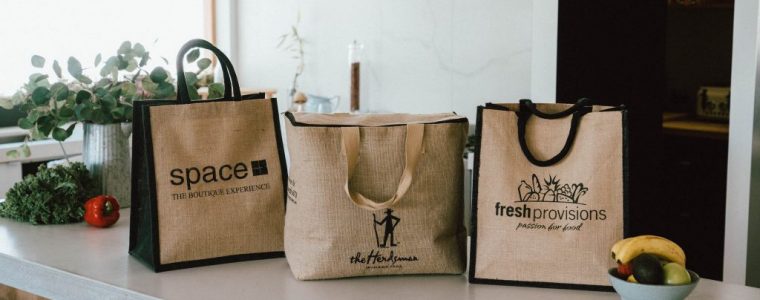
Which reusable bag materials are the best?
With the shift away from single use plastic bags, many people are now considering which type of reusable bag is the best choice for the environment. Reusable bags come in a wide range of materials and fabrics and we all have our favourites due to the design, size or look of the bag. Numerous studies have attempted to compare reusable bags and all have returned different results. Each one carries its own advantages and disadvantages, so the best reusable bags really ARE in the eye of the bag-holder!
While it’s true that the manufacturing and shipping of reusable bags has an impact on the environment, any reusable bag is more environmentally friendly than the alternative single use plastic or paper bag, so long as it is reused. Therefore it is important to choose high quality bags that will last for many years in order to reduce their environmental impact.
So, how do you pick the best reusable bag for your needs? We have outlined the most popular material options below to help with your decision.
POLYPROPYLENE
Polypropylene is a form of plastic—a flexible resin polymer. Nonwoven polypropylene (NWPP) bags are often regarded as the best reusable grocery bags, due to their low cost and relative durability. Think of your Coles or Woolies green bag and this is what we are referring to. NWPP fabric comes in various weights which is measured in grams per square meter (GSM). The higher the GSM, the stronger the material which then improves the quality and durability of the bag. We ensure all of our NWPP bags are made from 100gsm fabric or above and have reinforced handles to ensure they carry heavy loads of groceries easily.
Polypropylene can also be woven which also increases the strength of the fabric. As polypropylene is a soft plastic material, these bags can be placed in REDcycle recycling bins at the end of their useful life to be repurposed into new products.
Advantages
• Recyclable in REDcycle bins
• Very strong
• Can be made from recycled materials
• Chemical resistant
• May be woven, making it less porous and easier to wipe clean
• Wide variety of material color options
• Flexible printing options – screen printing, heat transfer prints or laminated with a gloss or matte finish.
Disadvantages
• Type of plastic
• Not biodegradable or compostable
• Product of the petrochemical industry
• Non-renewable resource
• Not recommended for machine washing (hand wash or spray clean only)
https://platinumbags.com.au/shopping-grocery-bags/
COTTON
Cotton bags come in many variations. Traditional cotton production involves a raw, natural fiber, but requires more chemicals and water than any other crop. So although cotton is perceived as a natural fabric, the chemicals and water used in its production have a higher environmental impact than other options. Organic cotton is a better option but still uses a significant amount of water.
Cotton fabric comes in various weights that are usually specified in ounces and this needs to be considered when comparing bags and prices. We generally like to use at least an 8 ounce fabric to provide a bag that is strong and good quality however we do offer less expensive bags that are between 5 and 8 ounces.
Advantages
• Biodegradable/Natural plant fibre
• Renewable resource
• Strong and durable
• Soft, smooth and nice to the touch
• Can be machine washed
• Cotton is an ideal base for logo printing on reusable bags
Disadvantages
• Not moisture resistant unless chemically treated. Cotton can be lined with an internal laminate to reduce moisture absorption.
• High water consumption crop
• Traditional cotton accounts for 16% of the world’s pesticides
• Heavy, bulky and expensive to ship
https://platinumbags.com.au/cotton-calico-canvas-bags/
JUTE
Jute is a natural plant fibre, often referred to as hessian or burlap. Jute has an earthy, natural look and feel which appeals to many brands and consumers. It is also a strong and durable fabric which means that jute bags tend to last for many years.
Advantages
• Natural renewable resource
• Jute is biodegradable and compostable
• Durable
• Grows in high rainfall areas and require little to no pesticides or irrigation
• Can be blended with other fabrics like cotton to form a JUCO fabric
Disadvantages
• Not very resistant to moisture unless chemically treated or laminated
• Grainy/rough texture
• Printing limited to thick lines and bold objects (no fine details)
https://platinumbags.com.au/jute-bags/
POLYESTER
Polyester is a polymer usually made from polyethylene terephthalate (PET), the same material found in drink bottles. Polyester can be recycled through reheating, thereby converting back into polymer fibres for further reuse.
Advantages
• Versatile material
• Polyester is resistant to water and mould
• Resistant to crinkling and compacts easily – can be folded, stuffed in a pouch or carried in a pocket.
Disadvantages
• A form of plastic
• Slow to break down
RECYCLED PET
Recycled PET is a durable, eco-friendly fabric made from post-consumer recycled plastic bottles and containers. Using recycled PET reduces waste and conserves oil and non-renewable resources.
Advantages
• Strong and durable
• Requires 2/3 less energy to manufacture products made out of PET than new plastics
Disadvantages
• A form of plastic
• The process of transporting, sorting and recycling post-consumer waste expends energy and can create pollution
With so many options of reusable bags now available, finding the best option can be a tricky choice. The most important factor to consider is durability. A reusable bag that has to be replaced after 10 uses is less environmentally friendly than one that is made from plastic. You need your bags to stand the test of time and last hundreds of trips to the supermarket.
We’re here to help you navigate the best option for your business, simply contact us today. For more on the plastic bag ban visit
